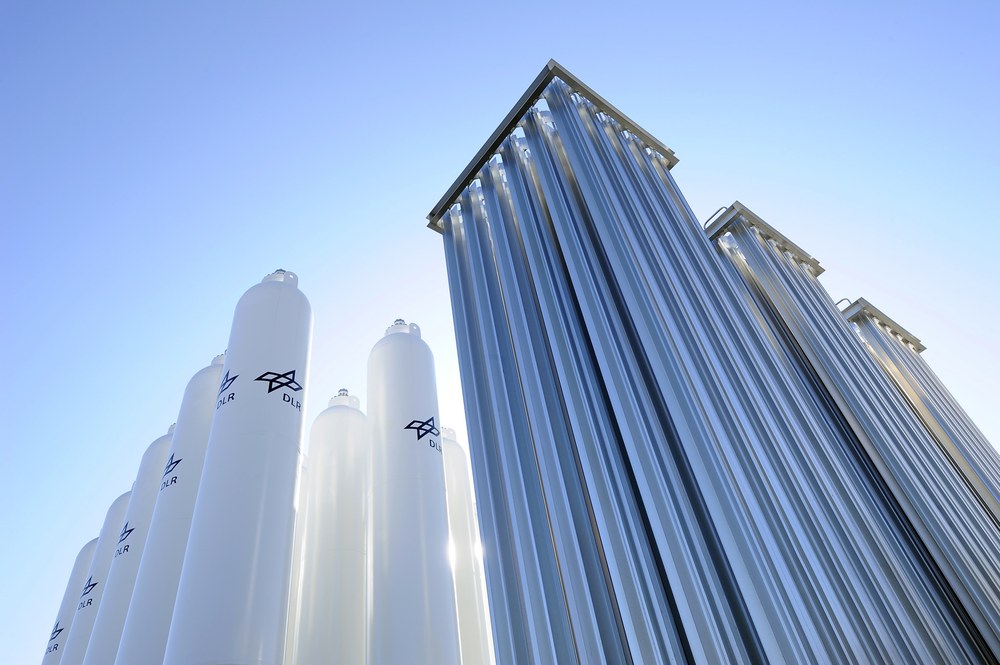DLR at the digital Hannover Messe 2021

- Green hydrogen, low-carbon industrial processes and innovative technologies for climate protection are DLR's central topics at Hannover Messe 2021.
- DLR's online exhibition stand is highlighting current ideas and projects from scientific research and technology transfer.
- DLR has expertise throughout the entire hydrogen process chain.
- Three new DLR institutes are strengthening research in the field of decarbonisation.
- Focus: Energy, hydrogen
Green hydrogen for the energy and transport systems of the future, environmentally friendly upgrades for industrial processes and innovative climate protection technologies – the German Aerospace Center (Deutsches Zentrum für Luft- und Raumfahrt; DLR) will be providing an exciting insight into its current research at the digital Hannover Messe 2021. The focus of DLR's online exhibition stand will be on highlighting ideas and projects from scientific research and technology transfer. The content will remain available beyond the duration of the trade fair (12–16 April 2021).
DLR and hydrogen – expertise throughout the process chain
Green hydrogen offers diverse benefits for the energy and transport transitions. It can be used for clean mobility, the efficient supply of heat and power, as a store for balancing fluctuating energy supplies from renewable sources, as a basis for alternative fuels and as an industrial process gas. "At DLR we look at the entire hydrogen process chain and combine expertise and experience from aeronautics, space, energy and transport research," says Professor Karsten Lemmer, Member of the DLR Executive Board responsible for Innovation, Technology Transfer and Research Infrastructure. "Our focus is on developing technologies for innovative energy systems. We aim to provide sustainable, reliable and affordable energy in a wide variety of forms."
Experts at DLR collaborate with industrial partners and advise political decision makers. Decisions made by companies and policy-makers regarding energy have far-reaching and long-lasting consequences. Therefore, a central component of DLR's research is proactive and comprehensive systems analysis. DLR researchers are working on enhanced electrolysis processes for the industrial production of hydrogen and on innovative processes for generating solar power. At the same time, they are determining the most efficient solutions for storing and transporting hydrogen. Research at DLR on the use of hydrogen in the energy sector, industry, for mobility in road, rail, sea and air transport and for spaceflight is closely linked. DLR's online exhibition stand will provide a cinematic insight to this world.
Decarbonising industry – reducing carbon emissions, combating climate change
Climate protection and environmentally-friendly production are now competitive metrics for companies and are driving change. DLR is engaged in a wide variety of projects in this field. Primary research topics include the energy- and resource-efficient design of industrial processes, the role of alternative fuels and the sustainable supply of factories and production centres with heat and power generated using renewable sources. DLR's large research facilities allow the development and testing of new technologies under real conditions and are also available to external researchers and industrial partners. They include the solar power tower developed at DLR, where 500 adjustable mirrors focus the Sun's rays to heat ceramic particles. These particles store heat and can be used as an environmentally-friendly energy source for various industrial applications. This process will soon be used as part of a pilot project in Italy to reduce the emissions caused by pasta production – a successful example of how DLR's low-carbon technologies are being applied in practice.
Continued expansion – three new energy-related institutes at DLR
With the establishment of three new institutes, DLR is intensifying its activities to further reduce the carbon emissions of the energy, mobility and industrial sectors.
At the Institute of Low-Carbon Industrial Processes, research is being conducted into how large, energy-intensive industrial sectors such as steel, aluminium, cement and chemical manufacturing can be redesigned to generate significantly lower harmful emissions. High-temperature heat pumps will play a key role in this. They are a large-scale technological option for power-heat coupling in industry.
At the Institute of Maritime Energy Systems, researchers are developing and testing innovative and efficient energy systems for shipping and the infrastructure required for their operation. In doing so, alternative fuels are being used in combination with fuel cells and battery systems.
The primary focus of the Institute of Future Fuels is on the development of technological concepts for the production of sustainable fuels using concentrated solar radiation. In the future, such fuels will primarily be produced on a large scale in Earth's sunbelt regions and traded globally. To this end, the Institute is working closely with industrial partners on the development of the necessary materials, components and processes.
